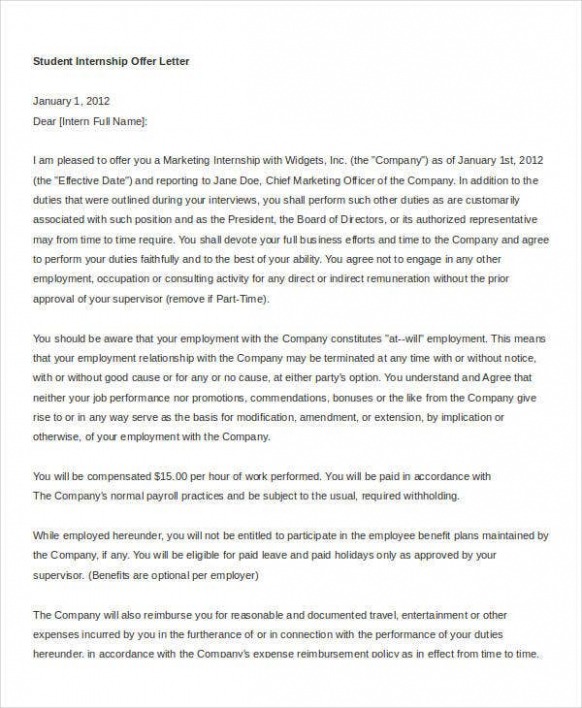Internship To Full Time Offer Letter Template Taxpayers experiencing tax financial debt troubles hardly ever contrast the internal revenue service deal in concession with the Chapter 13 insolvency. Often, the Chapter 13 will supply a more certain solution for the taxpayer to resolve tax debt. This article analyzes the family member benefits of both the offer in compromise and also Chapter 13.

An deal in compromise may be one of the most advertised tax obligation treatment. You can not listen to radio or enjoy TV without being pounded by advertisements to resolve your tax obligation debt. Commonly the ads proclaim that the internal revenue service has actually introduced that kindness in the collection of the tax debt exists for a limited time. The unfortunate reality is that the leniency announcement by the IRS was commonly for other problem location, such as tax shelters. The internal revenue service rejects approximately 85 percent of all offers in concession submitted as a result of doubt as to collectibility. Offers in compromise are usually filed since the taxpayer thinks the tax debt can not be paid, Question regarding Collectibility is the most common type of deal in concession. Other kinds of deals in concession are outside the scope of this write-up.
The advantage of the offer in concession is that the tax obligation responsibilities, including the associated charges and passion, are decreased to the quantity the IRS and also the taxpayer agree can be paid. Both parties should accept the terms of the deal in compromise. The offer in compromise is a agreement in between the internal revenue service and the taxpayer. The regards to the agreement can be applied versus the taxpayer along with the internal revenue service.

Acceptance of the offer in concession occurs when the internal revenue service believes that the offer goes to least as high as could be gathered by the IRS over the ten years life of the law of limitations. The internal revenue service will certainly reject an deal that is for a lesser quantity than it might otherwise collect.
The internal revenue service utilizes a consistent set of financial criteria that are not adaptable in both the analysis of the quantity paid monthly in an installation arrangement as well as in an deal in concession. These criteria limit the expenditures for living that the taxpayer can assert are needed for living. The requirements consist of food, housing and also utilities, transport, and expense health and wellness expenditure. The standards might cause drastic troubles for a taxpayer with a reasonably higher standard of living. Overhead are not impacted by the standards.
The analysis of the minimum deal in compromise that will certainly make the offer processable is the equity in the taxpayer’s properties plus the quantity that could be paid in an installation contract over a given amount of time. The duration of the future month-to-month settlements thought about by the IRS relies on how the offer will be paid by the taxpayer. The IRS desires 48 months of monthly settlement if the taxpayer supplies a round figure. The internal revenue service wants 60 months of regular monthly repayment if the offer is to be paid in a short-term contract of two years or less. Nonetheless, the internal revenue service will certainly take into consideration factual problems such as retirement as well as wellness of the taxpayer in shortening the period of the multiplier.



